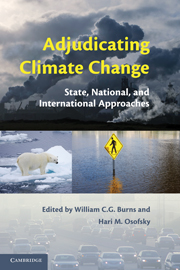Book contents
- Frontmatter
- Contents
- Foreword
- Acknowledgments
- Adjudicating Climate Change
- 1 Overview: The Exigencies That Drive Potential Causes of Action for Climate Change
- PART I SUBNATIONAL CASE STUDIES
- PART II NATIONAL CASE STUDIES
- PART III SUPRANATIONAL CASE STUDIES
- 11 The World Heritage Convention and Climate Change: The Case for a Climate-Change Mitigation Strategy beyond the Kyoto Protocol
- 12 The Inuit Petition as a Bridge? Beyond Dialectics of Climate Change and Indigenous Peoples' Rights
- 13 Bringing Climate Change Claims to the Accountability Mechanisms of International Financial Institutions
- 14 Potential Causes of Action for Climate Change Impacts under the United Nations Fish Stocks Agreement
- 15 Climate Change Litigation: Opening the Door to the International Court of Justice
- 16 The Implications of Climate Change Litigation: Litigation for International Environmental Law-Making
- 17 Conclusion: Adjudicating Climate Change across Scales
- Index
- References
16 - The Implications of Climate Change Litigation: Litigation for International Environmental Law-Making
Published online by Cambridge University Press: 25 August 2009
- Frontmatter
- Contents
- Foreword
- Acknowledgments
- Adjudicating Climate Change
- 1 Overview: The Exigencies That Drive Potential Causes of Action for Climate Change
- PART I SUBNATIONAL CASE STUDIES
- PART II NATIONAL CASE STUDIES
- PART III SUPRANATIONAL CASE STUDIES
- 11 The World Heritage Convention and Climate Change: The Case for a Climate-Change Mitigation Strategy beyond the Kyoto Protocol
- 12 The Inuit Petition as a Bridge? Beyond Dialectics of Climate Change and Indigenous Peoples' Rights
- 13 Bringing Climate Change Claims to the Accountability Mechanisms of International Financial Institutions
- 14 Potential Causes of Action for Climate Change Impacts under the United Nations Fish Stocks Agreement
- 15 Climate Change Litigation: Opening the Door to the International Court of Justice
- 16 The Implications of Climate Change Litigation: Litigation for International Environmental Law-Making
- 17 Conclusion: Adjudicating Climate Change across Scales
- Index
- References
Summary
INTRODUCTION
Everyone is talking about climate change. Climate change has been on the cover of almost every U.S. magazine in the past couple of years, including Vanity Fair, Time, Newsweek, the Economist, and even Sports Illustrated, on such television shows as Oprah and The Tonight Show, and in the movie theaters with Al Gore's An Inconvenient Truth and Who Killed the Electric Car? To be sure, this media attention is driven first by the increasingly clear scientific connection between greenhouse gas concentrations, climate change, and real impacts affecting real people. But the growing public awareness of climate change is also being driven by the actions of lawyers and other climate advocates who are increasingly litigating climate change in the world's courts, commissions, and congresses. Climate change even made an appearance before the U.S. Supreme Court. Win or lose (and some will surely win, as they did in the U.S. Supreme Court), these litigation strategies are significantly changing and enhancing the public dialogue around climate change.
This chapter discusses the awareness-building impacts of climate litigation as well as related impacts such strategies may have on the development of climate law and policy – even if many of the individual cases lose. The chapter does not discuss the significant implications if a tort action in the United States or the Inuit human rights claims, for example, were ultimately to prevail. Such precedents, which would obviously be far reaching, are discussed in the various chapters of this book addressing difficult litigation strategies.
- Type
- Chapter
- Information
- Adjudicating Climate ChangeState, National, and International Approaches, pp. 357 - 374Publisher: Cambridge University PressPrint publication year: 2009
References
- 4
- Cited by



